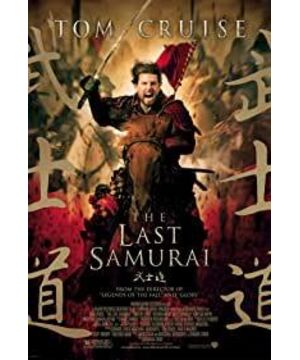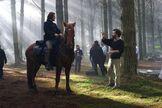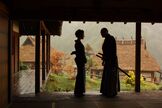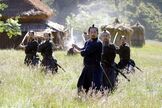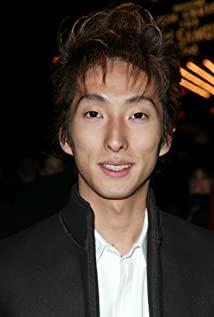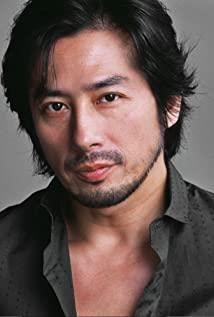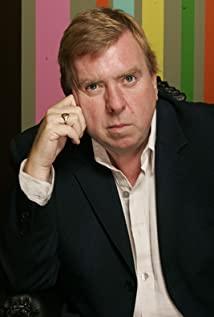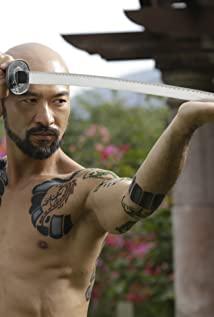When Katsumoto stared at the flourishing cherry blossoms falling in the distance before his death, the life of a great samurai came to an end. The era also came to an end. On a small scale, the last samurai can refer to Katsumoto, or Captain Nathan who found his soul in Bushido; on a large scale, it can refer to a fatal duel between modernity and tradition.
Although some people think that Edward Zwick, the director who reveres the film emperor, cannot fully explain the true meaning of Bushido, it is a new attempt for Westerners to understand the subject of Eastern philosophical thinking. The screenwriter of the film began with Nathan, an American, who read it as Nathan's spiritual journey in the East, expressing the Bushido spirit understood by Westerners, and Edward was also successful.
The path of Bushido's quest was borrowed from Nathan's diary as a clue. Before he came to the village, he was an alcoholic and debaucher who was devastated by the aftermath of the war, or a desolate soul who was exiled. After coming into contact with Bushido, he observed, questioned and experienced until he mastered and agreed with his mind, as the photographer said at the end. In that way, I found a place of peace of mind. It's not just Nathan who seeks Bushido in the film. Contrary to Nathan, Katsumoto admired Custer, who had sacrificed with two hundred dead men, and longed for the cherry blossoms in the courtyard that fell at the most beautiful moment. That poem is not finished, but there is an answer at the end, and life has been won brilliantly, which is the perfect curtain call. When the emperor learned of the death of his teacher, he said, "But, we can not forget who we are, or where we come from." ll tell you how he live." is one of the most moving dialogues in the film.
This war is a dividing line between tradition and modernity. Katsumoto's prototype, Saigo Takamori, was finally defeated. After the Meiji Restoration, the samurai class declined and died (see "The Qingbing Guard at Dusk"). It can be seen that the wheel of history will eventually run over the old stone ruthlessly. Remember the son of Katsumoto who insisted on staying on the trestle to find his death? No matter how brave he was, facing firearms and bullets, he finally failed to reach the other end of the bridge and fell down halfway. A tragic hero can't get a playoff from the samurai era, and it will eventually be eliminated. Some people say that this film is about the heart of Bushido's death for honor, but it reinforces the concept of victory and defeat, which I disagree with. Nathan finally understood the "send to death" behavior. He clearly knew that cold weapons were no match for the mad flow of cannonballs, but he had no regrets at all, because he realized Katsumoto's true heart, just to express his heart, for the belief he insisted, and for the blooming of life. The battle, even knowing that it will end in complete defeat.
The transformation process of the characters' psychology in the film is handled very naturally, dissecting the dialogues that cannot be communicated in words into the details of life, and the characters' images become as delicate as the tone of the film. Katsumoto didn't say much. Taka, who hated Nathan, went from resisting, to gradually seeing his warmth infect the children, to accepting the apology of the enemy, and finally falling in love with Nathan. It is also a slight frown, but it expresses two diametrically opposite emotions in the progress of the story. Then look at the general who originally looked down on Nathan. He mercilessly defeated Nathan, who was holding a wooden sword for the first time in the rain, and told him with the style and victory of an authentic samurai, "You are not worthy to pick up this sword" until he followed the inside. Mori's swordsmanship was advanced enough to tie him, and he nodded slightly to show acceptance and respect. There is also a guard who watches Nathan without a word throughout the film, and finally kills him while blocking a bullet, which also shows that Nathan is regarded as a companion.
Also worth mentioning is the cinematography and soundtrack of the film. Photography is by John Toll, who won an Oscar nomination for Braveheart. The mountain titles in ink and wash, the condensed and powerful silhouettes, the close-ups of the characters with a large aperture, the picturesque scene composition, etc., are simple and elegant. The soundtrack of the film is the master Hans Zimmer that I admire. He incorporates traditional Japanese musical instruments. The battle is magnificent, and the delicate feelings are euphemistically ups and downs. The soundtrack fully interprets the important narration where words cannot reach. Taka endured the pain of being about to part with her beloved, and when she changed shirts for Nathan,
The cherry blossoms, which symbolize Bushido, are the glory of the samurai that they pursue throughout their lives, and they are the blooming moments of forbearance and life. Once you have found morality, you will find your soul's destination, and your life will come to an end without any regrets.
View more about The Last Samurai reviews


